Sites: news | india | latam | brasil | indonesia
Feeds: news | india | latam | brasil | indonesia
topic: Religions
Social media activity version | Lean version
In a Himalayan Eden, a road project promises opportunity, but also loss
- In Nepal’s sacred Tsum Valley, Buddhist community members are conflicted about the ongoing construction of a road that will pass through the region.
- The Tsum Valley is one of the few, if not last, remaining beyul, or sacred valleys, governed by customary and Buddhist laws, where humans and wildlife have lived together in harmony for more than a millennium.
- The valley has maintained its religious and cultural traditions that have conserved biodiversity and its cultural uniqueness due to its remote location.
- The road is part of a government project that aims to connect every town across the country, bringing economic development and government services closer to remote mountainous communities.
Risky development in Uttarakhand: Interview with environmentalist Ravi Chopra
- Ravi Chopra, an esteemed environmentalist based in Uttarakhand, is renowned for his dedicated efforts to preserve natural resources within the Himalayan region.
- In 2019, the Supreme Court appointed Chopra as chair of a committee to review the controversial Char Dham highway construction project; he later resigned after construction proceeded despite the committtee’s findings that the project could pose significant risks to the ecologically fragile region.
- The Char Dham project drew international attention in November 2023, when a segment of a tunnel collapsed, trapping dozens of workers for 17 days.
- In a recent interview with Mongabay, Chopra discussed the environmental risks and hazards of development in Uttarakhand.
Nepal’s birds pay cost for country’s infrastructure development
- Nepal’s pursuit of development for the welfare of its citizens has made striking a balance between progress and environmental protection more challenging, especially in the context of bird conservation, experts say.
- Throughout 2023, Mongabay reported on various issues related to Nepal’s avian diversity, highlighting the threats they face and the glimmers of hope that community-led conservation efforts have offered.
- A building spree of hydropower plants and their associated power lines is among the chief threats taking a toll on both common and threatened species.
- Despite the challenges, the past year also brought some good news about vultures and sarus cranes, thanks to community ownership and engagement.
Muslim community must have a seat for global climate change discourse (commentary)
- Muslims account for nearly a quarter of the world’s total population, much of which is impacted by climate change.
- At the same time, Islamic worldviews can bring solution-based perspectives to events like the upcoming COP28 climate conference later this month.
- “It should be recognized that Islamic frameworks of climate solution thinking are important, and the climate issues facing Muslims need to be at the forefront of climate discourse as well,” a new op-ed argues.
- This post is a commentary. The views expressed are those of the author, not necessarily of Mongabay.
Ahead of COP28, pope spurs policymakers, faith leaders to push climate action
- In his October 4 papal declaration, Pope Francis called unequivocally for climate action in the face of a disastrously warming world.
- The pope’s message comes at a decisive time, as world leaders prepare to meet for the COP28 summit, in a United Nations climate process that many critics say is broken and has largely stalled since the landmark 2015 Paris Agreement.
- The pope’s call for action also comes at a time when the world’s faith-based climate movement — which was greatly energized by Paris, and which has had some notable successes since then — is struggling.
- Mongabay spoke with faith leaders, theologians and policymakers to assess the challenges that Francis’ message presents, and whether it can reinvigorate global religious leaders and spur the grassroots faithful to political and social action on the environment. Reportedly, Francis may travel to COP28 to press his message in person.
Pope Francis condemns world leaders for deeply flawed UN climate process
- In the leadup to the 2015 Paris summit, Pope Francis issued Laudato Si, “On Care for Our Common Home,” a landmark climate and faith document that ultimately saw much of the pope’s language of human responsibility and hope enshrined in the breakthrough climate agreement.
- But this week Pope Francis issued Laudate Deum, a follow up document which condemns world leaders for eight years of climate inaction and of making hollow unfulfilled pledges as they repeatedly fail to respond effectively to the severely escalating global climate crisis.
- The pope notes in the new document that it is the world’s poorest who suffer most from the battering of record heatwaves, storms, floods, droughts, melting glaciers, and rising seas. He also asserts that it is the obligation of the world’s wealthiest nations to decisively lead humanity out of the crisis, before Earth reaches “the point of no return.”
- It seems clear from the timing of Pope Francis’ declaration that he hopes it will positively influence COP28, the climate conference to be held in early December in the United Arab Emirates, where an oil company executive will preside as chair.
Apache tribe decry loss of sacred site to massive copper mine at both court and the U.N.
- The San Carlos Apache Tribe in Arizona, United States, has taken its legal battle against the U.S. government to the United Nations to save its traditional territory from what could be North America’s largest copper mine.
- The Indigenous tribe say that the mine will permanently alter desert ecosystems and destroy their most sacred site, akin to Jerusalem’s Temple Mount or Mecca’s Kaaba.
- The mine could produce up to 40 billion pounds of copper over 40 years, providing about 1,500 jobs, millions in tax revenue and compensation and minerals for renewable energy development.
- Both sides are awaiting a ruling from the 9th Circuit Court on whether destruction of the site violates the religious rights of the Apache people.
A Ramadan reflection on Islam and climate action (commentary)
- Muslims everywhere are currently observing Ramadan, a month of fasting and striving to grow their faith through prayer and acts of goodness.
- This month also marked the release of the new IPCC report on climate change, which provided the world with an urgent call to action.
- “The connection of the inner state of the heart with the outer state of physical action is the very point of intersection at which Ramadan and the new IPCC report meet. As Muslims focus on their worship…it is imperative that they make a very conscious commitment to connect their acts of worship towards the wellbeing of the Earth,” a new op-ed argues.
- This post is a commentary. The views expressed are those of the author, not necessarily of Mongabay.
Cultural heritage is an essential resource for climate change science too, reports say
- Four reports by the International Co-Sponsored Meeting on Culture, Heritage and Climate Change highlight that human cultural heritage has a wealth of knowledge to contribute to grapple with climate change.
- The reports also say that this diverse human heritage is under threat from climate change, poverty, rapid urbanization, policy, and failure to recognize land rights or grant access to resources.
- The authors share a list of cultural practices and knowledge systems that can mitigate and adapt to the impacts of climate change, from food systems and forest conservation to architecture and natural resources management.
- The International Co-Sponsored Meeting on Culture, Heritage and Climate Change reports are co-sponsored by the United Nations’ Intergovernmental Panel on Climate Change (IPCC), UNESCO and ICOMOS.
Across Latin America, Mennonites seek out isolation at the expense of forests
- A conservative religious group called Low German Mennonites has been accused of ongoing deforestation in Central and South America and encroaching on Indigenous communities’ land.
- They started migrating to Latin America from Canada more than 100 years ago, after refusing to integrate into modernizing society.
- With a reputation for being successful farmers, the group was granted privileges by Latin American governments that have played a facilitating role in the continuous expansion into previously untouched forest landscapes.
First Nations unite to fight industrial exploitation of Australia’s Martuwarra
- The Fitzroy River in the Kimberley region of Western Australia, one of the country’s most ecologically and culturally significant waterways, is facing proposals of further agriculture and mining development, including irrigation and fracking.
- In response, First Nations communities in the region have developed different methods to promote the conservation of the river, including curating cultural festivals, funding awareness campaigns, and working with digital technologies.
- First Nations land rights are held along the length of the Fitzroy River, the first time this has occurred across an entire catchment area in Australia.
- The catchment is the last stronghold of the world’s most “evolutionarily distinct and globally endangered” species, the freshwater sawfish (Pristis pristis) and is home to the threatened northern river shark (Glyphis garricki).
Brazil court upholds ban on missionaries trying to contact isolated Indigenous
- Brazil’s highest court has upheld a ban on missionaries entering reserves that are home to isolated and recently contacted Indigenous people during the pandemic.
- The decision comes in response to a lawsuit filed by Indigenous organizations against a law passed in July 2020 that allowed missionaries to remain inside these reserves despite the pandemic, in violation of Brazil’s official policy in place since 1987.
- According to Indigenous organizations, it’s crucial to reaffirm the non-contact policy under the administration of President Jair Bolsonaro that has pushed to “integrate” Indigenous people into society, and has been cozy with the evangelical movement.
- Besides the risk of disease spread, the presence of missionaries in these reserves undermines traditional cultures and social cohesion, and compels these nomadic communities to settle down, making the land more vulnerable to invasions by illegal ranchers and loggers, activists say.
In Madagascar, cultural taboos can protect or harm the environment
- “Fady,” the Malagasy term for sociocultural and spiritual taboos or beliefs, greatly influence people’s daily lives in Madagascar.
- Fady are ancestral rules that can apply to a place, a person or even certain animals and plants.
- As they pertain to the natural world, fady can have either a positive or a negative impact on the environment and wildlife.
Peru prosecutors probe Amazon deforestation linked to Mennonite communities
- Satellite images show a sudden surge in deforestation in areas settled by Mennonite communities in Peru’s Ucayali and Loreto regions.
- Those cases are among the rare instances of large-scale forest loss that has occurred in the Peruvian Amazon.
- Prosecutors say the clearing was unpermitted and illegal, and have launched an investigation.
- A lawyer for the Mennonites says they have complied with an injunction against forest clearing since last December, and that any deforestation that occurred this year is the work of outsiders.
Brazil judge blocks appointment of missionary to indigenous agency
- A Brazilian judge has blocked the highly controversial appointment of a former Christian Evangelical missionary to head FUNAI’s isolated and recently contacted indigenous tribes department. FUNAI is Brazil’s federal indigenous affairs agency.
- Ricardo Lopes Dias, an anthropologist and Evangelical pastor, was picked to head the department in February amid a barrage of criticism. He was a long-time missionary with New Tribes Mission (recently renamed Ethnos360), a fundamentalist Christians group notorious for past attempts to contact and convert isolated indigenous people.
- Indigenous groups and their advocates celebrated the court decision, with one leader saying: “It’s a really important victory, not just for indigenous [people] of the Javari Valley [Reserve in Amazonas state where most of Brazil’s isolated groups are located], but for all those who respect rule of law.”
- As COVID-19 continues spreading into the Brazilian Amazon, already infecting at least 500 indigenous people, FUNAI still hasn’t presented a contingency plan to deal with Coronavirus outbreaks in the region, or among isolated indigenous groups, another factor that weighed on the judge’s decision to block Dias’ appointment.
Shamans in the city: Brazil clinic offers traditional Amazonian treatments
- Created by an indigenous anthropologist, the Centro de Medicina Indígena Bahserikowi offers residents of the Brazilian Amazonian city of Manaus traditional healing and protective treatments by shamans from the Dessana, Tuyuka and Tukano ethnicities.
- Known as kumuã, the indigenous shamans apply the Bahsessé, a type of blessing from the Upper Rio Negro region that evokes the presence of rainforest beings who, according to them, hold all knowledge about humanity.
- In the nearly three years it’s been operating, the center has treated 2,700 people. One of its objectives is to teach the general public about traditional indigenous medicine, a practice that’s losing its foothold in the rainforest.
As COVID-19 rages, evangelical pastor may contact remote Amazon tribes
- U.S. Christian Baptist evangelical missionary Andrew Tonkin, from Frontier International, is allegedly planning to contact and convert isolated indigenous groups in the Javari Indigenous Reserve in western Amazonas state, Brazil — an accusation Tonkin denies. Ethnos360, another evangelical group has similar plans.
- Missionary work among isolated indigenous peoples is currently banned by FUNAI, Brazil’s indigenous agency. Marubo and Mayoruna indigenous leaders made the accusation against Tonkin, who has invaded the Javari Reserve, flouting FUNAI regulations, in the past.
- Brazil’s independent federal prosecutor’s office (MPF) has asked federal police to investigate Tonkin’s alleged plan of an illegal expedition to an area known as Igarapé Lambança, populated by isolated Korubo tribespeople. However, it is as yet unknown what action the federal police will take.
- The risk of evangelicals unknowingly spreading coronavirus is just one threat to Javari Reserve inhabitants. Major invasions by traffickers, illegal miners and loggers, along with an upswing in violence are well underway there, while President Jair Bolsonaro continues planning to open indigenous reserves to large-scale mining.
First possible COVID-19 indigenous cases detected near key Amazon reserve
- It is widely suspected that Brazil’s indigenous people will be very vulnerable to COVID-19, as they have shown little resistance to Western respiratory illnesses in the past. Isolated indigenous groups, lacking all healthcare support, would be particularly defenseless.
- UPDATE: After this story was first published, the city of Atalaia do Norte claimed that an indigenous Marubo man, suspected of coronavirus infection, tested negative for COVID-19. However, a journalist double-checking the facts found that no test was ever analyzed; when confronted, the city claimed a “communication mistake.”
- On 13 March, FUNAI potentially opened a new route for disease spread as it weakened its “no contact” isolated indigenous group rule, broadening sole decision-making power for contact from its central authority to 39 regional coordinators. Outcry quickly caused FUNAI to reverse itself, reinstating the “no contact” policy.
- Experts are very concerned about the indigenous harm coronavirus could cause, especially due to Jair Bolsonaro’s weakening of the rural public health service. Some analysts worry the health and social chaos COVID-19 would bring could cause ruralists and land grabbers to exploit the situation, seizing indigenous lands.
Bringing Christ and coronavirus: Evangelicals to contact Amazon indigenous
- As the coronavirus spreads around the globe, with more than 300 known cases already in Brazil, and members of Pres. Jair Bolsonaro’s staff infected, an evangelical Christian organization has purchased a helicopter with plans to contact and convert isolated indigenous groups in the remote Western Amazon.
- Ethnos360, formerly known as the New Tribes Mission, is notorious for past attempts to contact and convert isolated Indians, having spread disease among the Zo’é living in northern Pará state. Once contacted, the Zo’é, lacking resistance, began dying from malaria and influenza, losing over a third of their population.
- Ethnos360 is planning its Christian conversion mission despite the fact that FUNAI, Brazil’s indigenous affairs agency, has a longstanding policy against contact with isolated groups. Their so-called “missionary aviation” contact plan may also violate Brazil’s 1988 Constitution and international treaties.
- Analysts worry Brazil may be about to overturn its “no contact” FUNAI policy. In February, Bolsonaro put Ricardo Lopez Dias in charge of The Coordination of Isolated and Recently Contacted Indians (CGIIRC), a FUNAI department. Dias was a missionary for New Tribes Mission for over a decade, doing conversion work.
A bloody January for Brazil’s indigenous Kaiowá spotlights persecution
- Attacks on indigenous Kaiowá communities in the Brazilian state of Mato Grosso do Sul at the start of the year have highlighted a long-running campaign of persecution and growing violence against the group.
- A Jan. 2 arson attack on a house of worship in the Kaiowá community in Rio Brilhante municipality was the second of its kind in the region in less than six months; it’s still unclear whether the attack was committed by outsiders or was the result of an internal rift between villagers practicing traditional beliefs and those who have converted to Christianity.
- In Dourados municipality, security guards from private ranches mounted an attack on a community of some 100 Kaiowá families inside the Dourados Indigenous Reserve from Jan. 2-3, prompting the deployment of the National Public Security Force to Mato Grosso do Sul.
- The state has a homicide rate among indigenous people that is three times the national average. Land conflicts are seen as the key driver for the violence here, where indigenous territory is fast being lost to monoculture plantations and cattle ranches, and is also being subsumed by growing urban areas.
Pope makes impassioned plea to save the Amazon — will the world listen?
- In a 94-page document entitled “Querida Amazonia” (Dear Amazon), Pope Francis has made an impassioned plea for world leaders, transnational companies, and people everywhere to step up and protect the Amazon rainforest along with the indigenous people who live there and are its best stewards.
- The Amazon is seeing rapid deforestation in Brazil, Peru, Bolivia and Colombia, while violence against indigenous people is rising. Scientists say climate change and deforestation are forcing a forest-to-savanna tipping point, which could lead to a massive tree die-off, the release of huge amounts of CO2, and global climate catastrophe.
- “We are water, air, earth and life of the environment created by God,” Pope Francis writes in Dear Amazon. “For this reason, we demand an end to the mistreatment and destruction of mother Earth. The land has blood, and it is bleeding; the multinationals have cut the veins of our mother Earth.”
- Faith leaders applauded the pope: “Care for creation and… social justice for indigenous peoples and forest communities are part of one moral fabric,” said Joe Corcoran of the Interfaith Rainforest Initiative. But most media ignored the pope’s message, focusing instead on his verdict disallowing Amazon priests from marrying.
Bolsonaro sends Congress bill to open indigenous lands to mining, fossil fuels
- President Jair Bolsonaro has long pledged to open Brazil’s indigenous reserves in the Amazon and elsewhere to commercial mining, oil and gas exploration, cattle ranching and agribusiness, new hydroelectric dam projects, and tourism. This week he sent a bill to Congress that would do just that.
- And while the legislation would allow consultation with impacted indigenous populations, they would lack the power of veto, except in cases of “garimpo” or wildcat mining. Though the bancada ruralista agribusiness lobby is strong in Congress, it remains to be seen whether the bill will be approved.
- The legislation would also allow the use of GM, genetically modified, seeds in agricultural projects, a practice previously banned because of the danger of contaminating native seeds. Royalties would be paid to indigenous communities for the economic activities allowed in their reserves and communities.
- Bolsonaro called his project a “dream” but it has already met with withering criticism from indigenous organizations who see it as a nightmare. Apib, the Articulation of Indigenous Peoples, called it a ‘death project’ which would, under the mask of false good intentions, effectively authorize the invasion of their lands
Amazon’s Munduruku stage daring Christmas raid to recover sacred urns
- In 2013, during the building of the Teles Pires dam in the Brazilian Amazon, the Teles Pires Hydroelectric Company (CHTP) dynamited Karobixexe (Seven Rapids), a sacred site of the Munduruku, Apiaká and Kayabi peoples. Located just outside an indigenous reserve, it received no government protection.
- Also during construction, the firm removed funeral urns from a sacred site without indigenous permission and refused to return them. In December, 70 Munduruku occupied the Natural History Museum in Alta Floresta in Mato Grosso state, and took back the 12 funeral urns, plus other artifacts of theirs.
- The construction of the Teles Pires dam and destruction of Karobixexe both occurred without prior consultation of the Mundurku as required under law according to the International Labor Organization’s Convention 169, of which Brazil is a signatory.
- Other human remains were found by CHTP and 270,000 artifacts were removed to which the Munduruku now have no access. They have also been barred from another sacred site, Dekoka’a (Monkey Hill) impacted by the construction of the São Manoel Hydroelectric Power Station, also located on the Teles Pires River.
COP25: Laura Vargas inspires with power of faith in defense of forests
- While the Madrid United Nations climate summit (COP25) isn’t expected to yield major strides forward in the effort to curb the climate crisis, that hasn’t stopped hundreds of thousands of environmental activists from being there in the remote hope of influencing negotiators to act decisively.
- One such person is Laura Vargas, born in the Peruvian Andes, who saw her native home polluted and desecrated by the giant La Oroya copper smelting plant. At age 71, the former nun and socioenvironmental activist is in Madrid as part of the Interfaith Rainforest Initiative (IRI).
- The IRI hopes to leverage the voices and votes of millions of people of faith in five tropical nations — Brazil, Democratic Republic of the Congo, Indonesia, Colombia and Peru — in order to slow rapidly spreading deforestation, the destruction of biodiversity, and oppression of indigenous peoples.
- Vargas’ passion and energy is devoted to “caring for God’s creation” which encompasses all of nature, including humanity, and especially children. Her presence in Madrid, and the presence of half a million others like her protesting in the streets, could be the most hopeful news and potent force coming out of the COP25 summit.
‘Everything is dying’: Q&A with Brazilian indigenous leader Alessandra Munduruku
- Alessandra Munduruku recently spoke at the Global Climate Strike and presented the Munduruku Consultation Protocol to the European Parliament, tabling complaints about rights violations faced by indigenous peoples in Brazil.
- While in Berlin, the Brazilian indigenous leader told Mongabay about the on-the-ground impacts of agribusiness expansion and infrastructure development in the Amazon.
Vatican calls landmark meeting to conserve Amazon, protect indigenous peoples
- From October 6-27 Catholic Church bishops from nine Amazon nations, indigenous leaders and environmental activists will convene in Rome at the Vatican to develop a unified strategy for preserving the Amazon rainforest and protecting the region’s indigenous peoples.
- The event is an outgrowth of Pope Francis’ 2015 teaching document known as Laudato Si: On Care for Our Common Home — an indictment of capitalism’s excesses, global extraction industries, industrial agribusiness, and our consumer society, which the pope mostly holds responsible for climate change, deforestation and endangerment of indigenous cultures.
- The Vatican meeting to discuss the Amazon is seen as a direct threat to national sovereignty by Brazilian President Jair Bolsonaro, whose spokesperson earlier this year said of the Amazon synod that “it’s worrying and we want to neutralize it.”
- In a conference call this week, a few of those who will participate in the Amazon synod took a more positive view, saying that: “People are afraid that they’re going to have to change their own interests. But change has to come and the time is now.”
Interfaith leaders step up to protect the world’s ‘sacred’ rainforests
- In June 2017 — in response to the planetary climate crisis — Christian, Muslim, Jewish, Buddhist, Hindu and Taoist religious leaders joined hands with indigenous peoples from five tropical countries to form the Interfaith Rainforest Initiative (IRI) — devoted to protecting the world’s last great rainforests.
- Since then, IRI has worked to engage congregations of all faiths around the globe in an effort to, through political pressure, protect the rainforests of Brazil, Democratic Republic of the Congo, Indonesia, Colombia and Peru — accounting for 70 percent of the world’s tropical forests.
- During Climate Week at the United Nations in New York City starting September 22, IRI will unveil its Faiths for Forests Declaration and action agenda, jumpstarting its global campaign to harness faith-based leadership and the faithful in recognizing tropical forests as “sacred” and humanity’s obligation to provide stewardship to these great bastions of biodiversity.
- IRI recognizes the staggering scope of the challenges that lay ahead — to create and energize a worldwide interfaith movement that will successfully pressure national governments to act on climate — national governments that have long backed industrial agribusiness, mining and timber extraction within the world’s last great rainforests.
Bolsonaro government takes aim at Vatican over Amazon meeting
- The Catholic Church has scheduled a Synod for October, a meeting at which bishops and priests (and one nun) from the nine Latin American Amazon countries will discuss environmental, indigenous and climate change issues.
- Members of the new rightist Brazilian government of Jair Bolsonaro are eyeing the event with suspicion, seeing it as an attack on national sovereignty by a progressive church.
- To show its opposition to the Amazon Synod, the Brazilian government plans to sponsor a rival symposium in Rome, just a month before the Pope’s meeting, to present examples of “Brazil’s concern and care for the Amazon.”
- At issue are two opposing viewpoints: the Catholic Church under Pope Francis sees itself and all nations as stewards of the Earth and of less privileged indigenous and traditional people. Bolsonaro, however, and many of his ruralist and evangelical allies see the Amazon as a resource to be used and developed freely by humans.
Ancient spirituality guides a Maya town’s conservation efforts
- Guided by the teachings and beliefs of their ancestors, the indigenous residents of Concepción Chiquirichapa in southwestern Guatemala look to their local mountain, Siete Orejas, as a source of spiritual energy.
- Twenty-two altars exist on Siete Orejas in spots where the mountain’s energy dwells, according to Mayan belief. The town’s spiritual connection with the mountain has for the past 40 years motivated the community to restore and protect the mountain’s forests.
- Mongabay joined a local Maya spiritual guide in a fire ceremony on the mountain to ask for wisdom and the blessing of the Creator.
- This is the second part of Mongabay’s three-part profile of the Concepción community’s effort to restore the forest of Siete Orejas.
Limi Valley: A threatened Shangri-La for wildlife (commentary)
- Despite being extremely rich in wildlife and biodiversity, all is not well in in Nepal’s Limi Valley, an area of global importance for highland wildlife, both flora and fauna.
- The valley is facing an increasing number of anthropogenic and natural threats, the most prominent being human-wildlife conflict and the illegal wildlife trade. In spite of these challenges to conservation, however, the area also provides ample opportunities to address the issues it is facing.
- The Limi Valley is in need of well-thought-out, long-term conservation initiatives. However, any initiatives aimed at conserving the unique biodiversity of the area in the long-run must address the complex issue of human-wildlife conflict. This will involve working directly with local people in alternative livelihood and income generation activities.
- This post is a commentary. The views expressed are those of the author, not necessarily Mongabay.
Religious leaders mobilize to protect indigenous people and forests
- Religious leaders joined forces with indigenous peoples from Brazil, Colombia, the Democratic Republic of Congo, Indonesia, Meso-America and Peru at the Nobel Peace Center in Oslo in 2017 to launch the Interfaith Rainforest Initiative (IRI).
- The IRI plans to mobilize high profile religious leaders to intervene in policy forums and advocate for forests and indigenous people with support from UN Environment.
- It has been estimated that one third of climate change mitigation is from tropical rainforests and securing land rights for indigenous peoples is an effective and low-cost method of reducing carbon emissions.
How Tibetan Buddhism and conservation efforts helped Eurasian otters thrive in a city of 200,000 people (commentary)
- The Eurasian otter (Lutra lutra) is now locally extinct in most of its former range in China due to hunting for its pelt, water pollution, and habitat destruction.
- Recently, researchers recorded a healthy population of otters in Yushu, Qinghai, a city of 200,000 people.
- What allowed this population to survive? Besides conservation efforts, Tibetan Buddhism traditions also played a vital role in reducing hunting and maintaining freshwater ecosystem health.
- This post is a commentary. The views expressed are those of the author, not necessarily Mongabay.
Pope’s message to Amazonia inspires hope, but will it bring action?
- On 19 January, Pope Francis spoke to a crowd of thousands, including many indigenous people, in Puerto Maldonado, Peru, the capital of Madre de Dios state in the Amazon, a region that has seen significant deforestation (62,500 hectares between 2012 and 2016), and significant violence due to illegal mining.
- Latin American analysts, while excited about the pope’s visit, and appreciative of his spotlighting of illegal mining in Madre de Dios and other environmental problems across Amazonia, expressed doubt that the papal visit will have much impact in the long run.
- The pope singled out large corporations in his address: “[G]reat business interests… want to lay hands on [the Amazon’s] petroleum, gas, lumber, gold and other forms of agro-industrial monocultivation,” he said. “We have to break with the historical paradigm that views Amazonia as an inexhaustible source of supplies for other countries without concern for its inhabitants.”
- The pope invited a top-down and bottom-up response by Catholics to the Amazon crisis, calling on indigenous people “to shape the culture of local churches in Amazonia,” and announcing next year’s first-ever Synod for Amazonia – a gathering of global bishops who will put papal doctrine such as Laudato Si, his landmark 2015 papal encyclical, into action.
Pope set to visit site of deforestation, indigenous struggle in Peru
- Pope Francis plans to visit Puerto Maldonado in the Peruvian region of Madre de Dios Friday morning on his trip to South America.
- He will speak with indigenous communities in a coliseum.
- Madre de Dios had the second-highest rate of deforestation in the Peruvian Amazon in 2017, with 208 square kilometers (80 square miles) of forest cover loss as a result of farming, logging and mining.
Munduruku standoff against Amazon dam builders potentially explosive
- On 13 October, eighty Munduruku warriors and shamans tried to occupy the São Manoel dam on the Teles Pires River in one of the most remote parts of the Amazon. But the government and construction companies had been tipped off in advance.
- Thirty armed Public Security National Force police had been flown in and blocked them from entering the site. The Munduruku were met by teargas and flash bombs. They have since left the immediate vicinity, but their demands remain unresolved.
- The Munduruku say that the construction firms, to end a July occupation of the dam, had agreed to a September meeting and to apologize for the destruction of two of their most sacred sites — one of them the equivalent of Christian Heaven — and to apologize for collecting and storing sacred urns without proper rituals.
- According to the Indians, the performance of these apology rituals is now vital to the survival of the Munduruku as a people, and to the survival of the Amazon itself, but the companies remain adamant in their denial of wrongdoing. Tensions remain high, and many fear more violence could erupt.
Trump’s global resorts put profit first, environment last, critics say
- Donald Trump’s negative environmental record in Scotland and elsewhere has conservationists concerned in Bali, where Trump firms are developing a major resort and golf facility known as Trump International Hotel & Tower Bali.
- Another resort under development, the Trump International Hotel & Tower Lido, a 700-hectare facility including a six-star luxury resort, theme park, country club, spa, villas, condos and 18-hole golf course threatens the nearby Gunung Gede Pangrango National Park, one of Java’s last virgin tropical forests.
- Mongabay looked into Trump’s claims that he is an environmentalist, winning “many, many environmental awards.” We were able to locate just two — one a local New York award, and another granted by a golf business association. The Trump Organization did not respond to requests to list Mr. Trump’s awards.
- Trump’s environmental record as president, and as a businessman, is abysmal, say critics. His attempt to defund the U.S. Energy Star program, they say, is typical of a compulsion to protect his self interest: Energy Star has given poor ratings to nearly all Trump’s hotels, which experts note has possibly impacted his bottom line.
People of all faiths face climate change with hope, action, urgency
- Pope Francis gave Trump a copy of his encyclical on global environmental protection during the president’s visit to Europe in May. A week later Trump pulled out of the Paris Climate Agreement.
- While the majority of U.S. Catholics voted for Trump, and polled less favorably toward the pope after publication of Laudato Si, his bold plea to save the earth continues to energize leaders of all faiths.
- Examples abound: in May, 55 “emerging faith leaders” from 17 countries met in Brazil to identify realistic renewable energy and sustainability projects for their nations. Also in May, nine large Catholic organizations from around the globe announced divestment from coal, oil and gas stocks.
- Hindu spiritual leaders are urging the jettisoning of coal for alternative energy, and reducing pollution around temples. Morocco committed to converting 15,000 mosques to renewable energy by 2019. Jordan spiritual leaders have committed to going solar. Change could be faster, many agree, but it is ongoing.
E.O. Wilson on Half-Earth, Donald Trump, and hope
- Celebrated biologist’s new book outlines an audacious plan to save the biodiversity of Earth
- He is also the author of numerous biological concepts, including island biogeography and biophilia
- In a wide-ranging interview, he also discusses the Trump phenomenon and decries de-extinction and so-called ‘Anthropocenists’
An unconventional trinity: conservation, religion, and evolution
- Next year is the 100th Anniversary of the United States National Park Service, a branch of the Department of the Interior.
- The NPS largely owes its existence to one of the Twelve Apostles of the Church of Jesus Christ Latter Day Saints — a clear example of how religion and conservation, belief and science, though they might seem like strange bedfellows, have led directly to earth stewardship in our time.
- This post is a commentary. The views expressed are those of the author alone.
Photos: ‘Shocking’ scale of illegal trade in Indian star tortoise uncovered
- The Indian star tortoise is popular as a pet and spiritual symbol.
- Study found evidence of a large-scale network of illegal tortoise trade in southern India.
- After being transported to eastern India, these tortoises are shipped off to other Asian countries like Thailand, Malaysia, Singapore and China, researchers found.
Bali’s mountain dwellers govern with ancient palm leaf treatises
- Residents of Tenganan in the hills of eastern Bali produced forestry regulations that predate the 11th century. The village still adheres to them.
- The local Aga people are trying to negotiate a balance between maintaining the environment and accommodating foreign tourists.
- According to a local regulation on collective ownership, individuals within the village can neither draw up deeds for local land nor transfer parcels to people outside the community.
Pope apologizes for church’s crimes against indigenous people
 On the heels of calling for global action to combat climate change, Pope Francis on Thursday issued an apology for “sins” the Catholic church committed against the indigenous people in Latin America since the European conquest of the region. In an address to a gathering of activists in Santa Cruz, Bolivia Pope Francis asked for […]
On the heels of calling for global action to combat climate change, Pope Francis on Thursday issued an apology for “sins” the Catholic church committed against the indigenous people in Latin America since the European conquest of the region. In an address to a gathering of activists in Santa Cruz, Bolivia Pope Francis asked for […]
Pope calls for action on climate change, biodiversity loss
 Rainforest in Borneo. In a letter being widely heralded by environmentalists, yesterday Pope Francis called on world leaders to address threats to the planet, including climate change and species extinction. Notably, the leader of the Catholic Church singled out “human activity” as the main driver of these threats. Calling climate change an urgent challenge and […]
Rainforest in Borneo. In a letter being widely heralded by environmentalists, yesterday Pope Francis called on world leaders to address threats to the planet, including climate change and species extinction. Notably, the leader of the Catholic Church singled out “human activity” as the main driver of these threats. Calling climate change an urgent challenge and […]
Reeling in religious messages: how faith impacts fisheries in Fiji
 Marrying religion and conservation could be key to making Fiji’s fisheries sustainable Fijians appear to enter life with vocal cords prepped for singing. It’s an ideal trait, because most are deeply devoted to church where their voices are put to good use. When walking through villages on any given day, these beautiful sounds can be […]
Marrying religion and conservation could be key to making Fiji’s fisheries sustainable Fijians appear to enter life with vocal cords prepped for singing. It’s an ideal trait, because most are deeply devoted to church where their voices are put to good use. When walking through villages on any given day, these beautiful sounds can be […]
How Islam could help save Aceh’s forests
 Rainforest stream near Jantho in Aceh, Indonesia. Photos by Rhett A. Butler Aceh, Indonesia has found a new ally in the struggle to protect the province’s remaining natural forests: Sharia law. Last week, the government released a book titled “Guidelines for Forest Management Based on Sharia and Customary Law: Preventing Corruption in the Forestry Sector.” […]
Rainforest stream near Jantho in Aceh, Indonesia. Photos by Rhett A. Butler Aceh, Indonesia has found a new ally in the struggle to protect the province’s remaining natural forests: Sharia law. Last week, the government released a book titled “Guidelines for Forest Management Based on Sharia and Customary Law: Preventing Corruption in the Forestry Sector.” […]
Next big idea in forest conservation: Reconnecting faith and forests
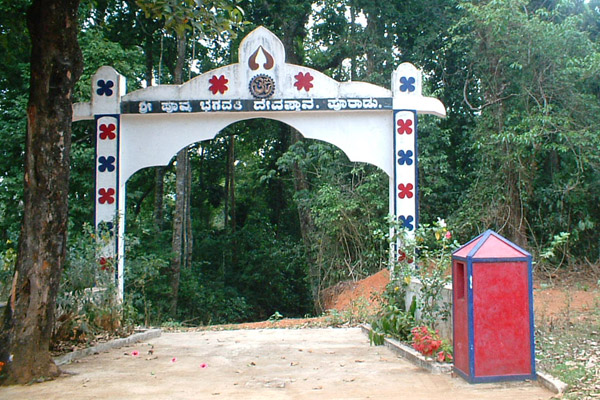 Innovation in Tropical Forest Conservation: Q&A with Dr. Shonil Bhagwat Entrance to a sacred grove in Kodagu, India. Photo courtesy of Shonil Bhagwat. “In Africa, you can come across Kaya forests of coastal Kenya, customary forests in Uganda, sacred forest groves in Benin, dragon forests in The Gambia or church forests in Ethiopia…You can also […]
Innovation in Tropical Forest Conservation: Q&A with Dr. Shonil Bhagwat Entrance to a sacred grove in Kodagu, India. Photo courtesy of Shonil Bhagwat. “In Africa, you can come across Kaya forests of coastal Kenya, customary forests in Uganda, sacred forest groves in Benin, dragon forests in The Gambia or church forests in Ethiopia…You can also […]
Pope Francis: ‘this is our sin: we exploit the earth’
 In Southern Italy over the weekend, Pope Francis reiterated his view that environmental destruction constituted a sin. Visiting the largely agricultural region of Molise, the pope responded to an address by a local farmer attending university. “I fully agree what has been said about ‘safeguarding’ the earth, to bear fruit without ‘exploitation’. This is one […]
In Southern Italy over the weekend, Pope Francis reiterated his view that environmental destruction constituted a sin. Visiting the largely agricultural region of Molise, the pope responded to an address by a local farmer attending university. “I fully agree what has been said about ‘safeguarding’ the earth, to bear fruit without ‘exploitation’. This is one […]
Pope Francis: ‘if we destroy Creation, Creation will destroy us!’
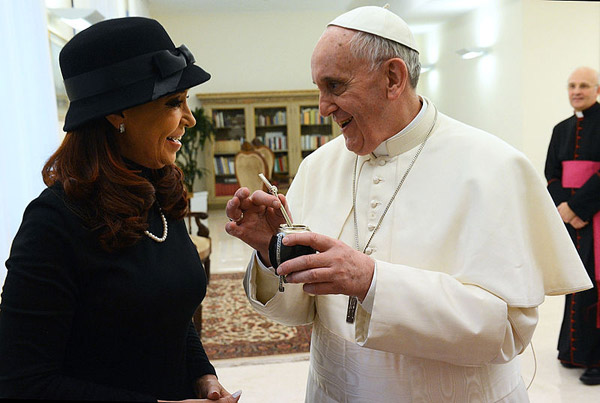 Pope Francis I, who named himself after the nature-loving Saint from Assisi, spoke about the need to safeguard creation during an audience at the Vatican last week. “We are Custodians of Creation,” he said on Wednesday. “But when we exploit Creation we destroy the sign of God’s love for us, in destroying Creation we are […]
Pope Francis I, who named himself after the nature-loving Saint from Assisi, spoke about the need to safeguard creation during an audience at the Vatican last week. “We are Custodians of Creation,” he said on Wednesday. “But when we exploit Creation we destroy the sign of God’s love for us, in destroying Creation we are […]
Islamic clerics issue ‘fatwa’ against poaching, declare the illegal wildlife trade ‘haram’
 Baby orangutans, like this Sumatran orangutan on its mother’s back, are often kept illegally in Indonesia. Photo by Rhett A. Butler Indonesia’s Islamic clerics drew praise from conservation groups last week after the top clerical body in the world’s largest Muslim-majority country issued a fatwa, or religious decree, against poaching and wildlife trafficking. The Indonesian […]
Baby orangutans, like this Sumatran orangutan on its mother’s back, are often kept illegally in Indonesia. Photo by Rhett A. Butler Indonesia’s Islamic clerics drew praise from conservation groups last week after the top clerical body in the world’s largest Muslim-majority country issued a fatwa, or religious decree, against poaching and wildlife trafficking. The Indonesian […]
Rare animal species and Buddhist monks in danger of losing their home to cement quarry
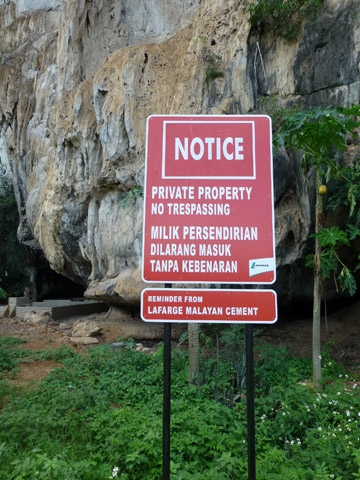 An international cement company Lafarge, winner of a Green Initiative award, is considering quarrying a cave in Malaysia which is the sole home of a critically endangered species. The proposed operations also threaten a Buddhist monastery near the cave where monks are facing eviction. Kanthan cave in Peninsular Malaysia is located in a limestone hill, […]
An international cement company Lafarge, winner of a Green Initiative award, is considering quarrying a cave in Malaysia which is the sole home of a critically endangered species. The proposed operations also threaten a Buddhist monastery near the cave where monks are facing eviction. Kanthan cave in Peninsular Malaysia is located in a limestone hill, […]
Tibetan monks partner with conservationists to protect the snow leopard
 The 2013 Zoos and Aquariums: Committing to Conservation (ZACC) conference runs from July 8th—July 12th in Des Moines, Iowa, hosted by the Blank Park Zoo. Ahead of the event, Mongabay.com is running a series of Q&As with presenters. For more interviews, please see our ZACC feed. Snow leopard. Photo by: Steve Winter/National Geographic. Tibetan monks […]
The 2013 Zoos and Aquariums: Committing to Conservation (ZACC) conference runs from July 8th—July 12th in Des Moines, Iowa, hosted by the Blank Park Zoo. Ahead of the event, Mongabay.com is running a series of Q&As with presenters. For more interviews, please see our ZACC feed. Snow leopard. Photo by: Steve Winter/National Geographic. Tibetan monks […]
Harnessing religious teachings about stewardship to protect the planet – an interview with Sikh activist Bandana Kaur
 Tapping into religious teachings about stewardship, environmental activist Bandana Kaur enlists Sikhs around the world to safeguard the environment. Many religious groups have taken on the role of environmental custodians, citing scriptures that urge living in harmony with plants and animals. Representatives of nine world religions pledged in 2009 to develop environmental programs. The Sikh […]
Tapping into religious teachings about stewardship, environmental activist Bandana Kaur enlists Sikhs around the world to safeguard the environment. Many religious groups have taken on the role of environmental custodians, citing scriptures that urge living in harmony with plants and animals. Representatives of nine world religions pledged in 2009 to develop environmental programs. The Sikh […]
New pope: ‘let us be protectors of creation’
 Pope Francis I. Photo by: Casa Rosada. In his first homily as the new pope, Francis I spoke of the need to act as protectors both for the environment as well as for the poor and weak. With his focus on the environment the new pope echoes both his namesake, Saint Francis of Assisi, as […]
Pope Francis I. Photo by: Casa Rosada. In his first homily as the new pope, Francis I spoke of the need to act as protectors both for the environment as well as for the poor and weak. With his focus on the environment the new pope echoes both his namesake, Saint Francis of Assisi, as […]
Prayers for dying elephants: Buddhists hold prayer ceremony for elephants decimated by poachers
 A monk at Wat That Thong temple in Bangkok During a Buddhist merit-making ceremony to pray for the tens of thousands of elephants poached annually. Photo by: © WWF Thailand. Buddhist leaders prayed for slaughtered African elephants in Bangkok, Thailand last week, reports WWF. During a special merit-making ceremony, often reserved for the recently deceased, […]
A monk at Wat That Thong temple in Bangkok During a Buddhist merit-making ceremony to pray for the tens of thousands of elephants poached annually. Photo by: © WWF Thailand. Buddhist leaders prayed for slaughtered African elephants in Bangkok, Thailand last week, reports WWF. During a special merit-making ceremony, often reserved for the recently deceased, […]
Chasing down ‘quest species’: new book travels the world in search of rarity in nature
 A poster-child for rare species: the Javan rhino (Rhinoceros sondaicus) captured on camera trap in its last stand: Ujung Kulon National Park Java, Indonesia. Photo by: © Mike Griffiths / WWF-Canon. In his new book, The Kingdom of Rarities, Eric Dinerstein chases after rare animals around the world, from the maned wolf (Chrysocyon brachyurus) in […]
A poster-child for rare species: the Javan rhino (Rhinoceros sondaicus) captured on camera trap in its last stand: Ujung Kulon National Park Java, Indonesia. Photo by: © Mike Griffiths / WWF-Canon. In his new book, The Kingdom of Rarities, Eric Dinerstein chases after rare animals around the world, from the maned wolf (Chrysocyon brachyurus) in […]
Sri Lanka to give poached ivory to Buddhist temple, flouting international agreements
 The Sri Dalada Maligawa Buddhist Temple, which may soon receive 359 elephant tusks. The Sri Lankan government is planning to give 359 elephant tusks to a Buddhist temple, a move that critics say is flouting the Convention on International Trade in Endangered Species (CITES). The illegal tusks were seized in Sri Lanka last May en […]
The Sri Dalada Maligawa Buddhist Temple, which may soon receive 359 elephant tusks. The Sri Lankan government is planning to give 359 elephant tusks to a Buddhist temple, a move that critics say is flouting the Convention on International Trade in Endangered Species (CITES). The illegal tusks were seized in Sri Lanka last May en […]
Vatican condemns elephant poaching, pledges steps
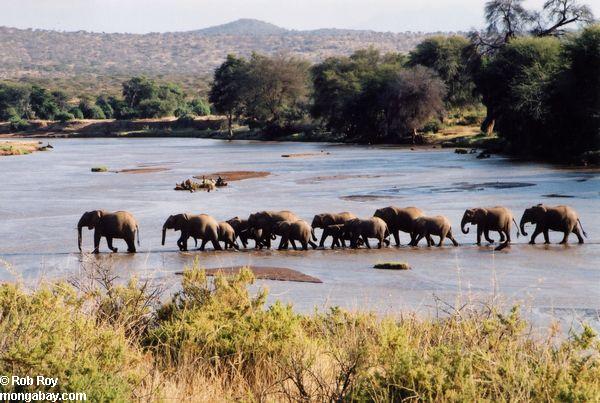 Elephant herd in Kenya. It’s estimated that around 25,000 elephants were killed by poachers in 2011, though the number could be even higher. Photo by: Rob Roy. Responding to an investigative report by National Geographic, the Vatican has condemned elephant poaching for ivory and pledged three steps to help in the battle to save the […]
Elephant herd in Kenya. It’s estimated that around 25,000 elephants were killed by poachers in 2011, though the number could be even higher. Photo by: Rob Roy. Responding to an investigative report by National Geographic, the Vatican has condemned elephant poaching for ivory and pledged three steps to help in the battle to save the […]
Heartland Institute losing major corporate sponsors after comparing climate change advocates to mass-murderers
 The Heartland Institute’s billboard campaign, which was pulled after 24 hours, has led to repercussions for the climate-denialist group. The Heartland Institute has lost two corporate supporters since it unveiled a billboard campaign that compared those who accept the science of climate change to mass murderer Ted Kaczynski also known as the Unabomber. Yesterday, State […]
The Heartland Institute’s billboard campaign, which was pulled after 24 hours, has led to repercussions for the climate-denialist group. The Heartland Institute has lost two corporate supporters since it unveiled a billboard campaign that compared those who accept the science of climate change to mass murderer Ted Kaczynski also known as the Unabomber. Yesterday, State […]
Exploring Asia’s lost world
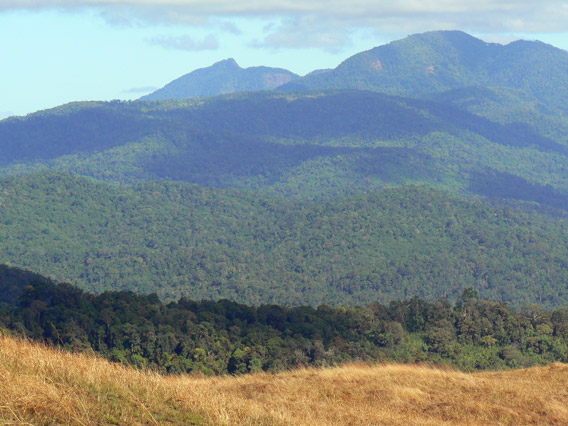 Abandoned by conservationists and the global community, Virachey National Park in Cambodia remains a wildernesses of surprises. An interview with Greg McCann. Haling-Halang and the barrier mountains separating Cambodia and Laos as seen from the Veal Thom grasslands, a place few outsiders have ever seen. Could tigers, Javan rhinos, or saola live in these mountains? […]
Abandoned by conservationists and the global community, Virachey National Park in Cambodia remains a wildernesses of surprises. An interview with Greg McCann. Haling-Halang and the barrier mountains separating Cambodia and Laos as seen from the Veal Thom grasslands, a place few outsiders have ever seen. Could tigers, Javan rhinos, or saola live in these mountains? […]
Indigenous groups oppose priest pushing for road through uncontacted tribes’ land
.jpg) A view of Puerto Esperanza. Photo by: David Hill. A grassroots indigenous organization in Peru is calling for the removal of an Italian Catholic priest from the remote Amazon in response to his lobbying to build a highway through the country’s biggest national park. The park, in the Purus region in south-east Peru, was founded […]
A view of Puerto Esperanza. Photo by: David Hill. A grassroots indigenous organization in Peru is calling for the removal of an Italian Catholic priest from the remote Amazon in response to his lobbying to build a highway through the country’s biggest national park. The park, in the Purus region in south-east Peru, was founded […]
Judge suspends Brazilian dam that would flood sacred waterfalls
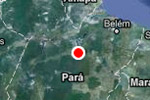 View Larger Map A federal judge has suspended the construction of a 1,820 megawatt dam on the Teles Pires River in the Amazon. The judge found that indigenous communities were not properly consulted about the dam, which would flood a sacred site, known as the Seven Waterfalls, as well as imperil the livelihoods of indigenous […]
View Larger Map A federal judge has suspended the construction of a 1,820 megawatt dam on the Teles Pires River in the Amazon. The judge found that indigenous communities were not properly consulted about the dam, which would flood a sacred site, known as the Seven Waterfalls, as well as imperil the livelihoods of indigenous […]
Indigenous groups fight for recognition and illumination in Peru
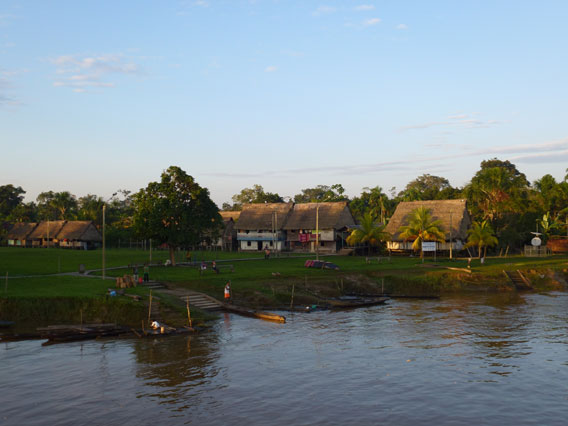 Amazon community on the Rio Corrientes. Photo by: Patrick le Flufy. “Shh, wait here,” Wilson told me. I ducked down behind the buttress of a large tree to wait. We had been walking through the jungle for a few hours. At first we followed a path through the undergrowth, a wet world of ferns, trunks […]
Amazon community on the Rio Corrientes. Photo by: Patrick le Flufy. “Shh, wait here,” Wilson told me. I ducked down behind the buttress of a large tree to wait. We had been walking through the jungle for a few hours. At first we followed a path through the undergrowth, a wet world of ferns, trunks […]
Supernatural beliefs keep hunting sustainable on Indonesian island
 A northern common cuscus in Misool, Raja Ampat. Photo by: Dmitry Telnov. How do indigenous communities hunt without pushing target species to local extinction? In other words, how have communities retained sustainable practices over countless generations? One answer is given in a new study by the Center for International Forestry Research (CIFOR) and the Center […]
A northern common cuscus in Misool, Raja Ampat. Photo by: Dmitry Telnov. How do indigenous communities hunt without pushing target species to local extinction? In other words, how have communities retained sustainable practices over countless generations? One answer is given in a new study by the Center for International Forestry Research (CIFOR) and the Center […]
Media campaign says mercury pollution a pro-life issue
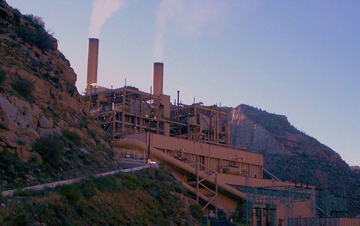 While pro-life activists usually target abortion, a new campaign is working to broaden the pro-life message. A $250,000 media campaign in the U.S., including TV spots and radio ads in eight states, hopes to pressure conservative senators to protect unborn children by supporting the Environmental Protection Agency’s (EPA) regulations on mercury emissions from coal-fired plants. […]
While pro-life activists usually target abortion, a new campaign is working to broaden the pro-life message. A $250,000 media campaign in the U.S., including TV spots and radio ads in eight states, hopes to pressure conservative senators to protect unborn children by supporting the Environmental Protection Agency’s (EPA) regulations on mercury emissions from coal-fired plants. […]
Locals key to saving primate-rich wetlands in Cote D’Ivoire
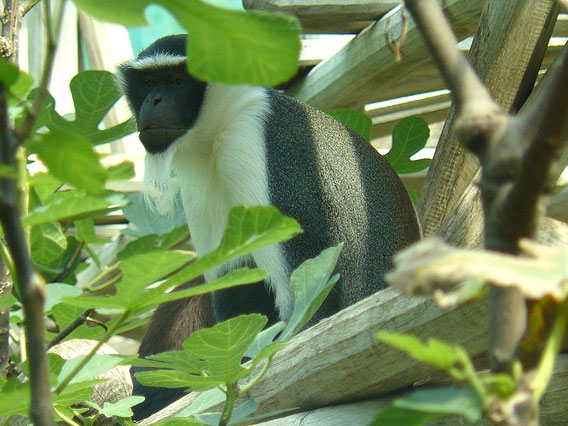 One of the world’s top 25 most endangered primates: the roloway monkey (Cercopithecus diana roloway) photographed in the Munich Zoo. Saved from being converted into a vast palm oil plantation by PALM-CI in 2009, the Ehy Tanoé wetlands and forest in the Cote D’Ivoire (Ivory Coast) is home to three gravely endangered primates and as […]
One of the world’s top 25 most endangered primates: the roloway monkey (Cercopithecus diana roloway) photographed in the Munich Zoo. Saved from being converted into a vast palm oil plantation by PALM-CI in 2009, the Ehy Tanoé wetlands and forest in the Cote D’Ivoire (Ivory Coast) is home to three gravely endangered primates and as […]
The Pope hopes for responsible climate deal
Pope Benedict XVI called for a “responsible” deal at the Vatican today just ahead of the two week Climate Summit in Durban, South Africa. “I hope that all members of the international community agree on a responsible and credible response to this worrisome and complex phenomenon, taking into account the needs of the poorest and […]
Photos: Cambodians rally as ‘Avatars’ to save one of the region’s last great rainforests
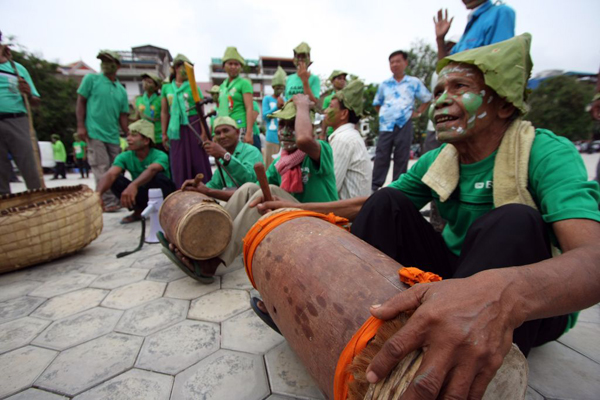 Cambodian villagers dressed as ‘avatars’ to protest the destruction of their forest. Photo courtesy of: Prey Lang Network. Two hundred Cambodians rallied in Phnom Penh last week to protest the widespread destruction of one of Southeast Asia’s last intact lowland rainforests, known as Prey Lang. In an effort to gain wider media attention, protestors donned […]
Cambodian villagers dressed as ‘avatars’ to protest the destruction of their forest. Photo courtesy of: Prey Lang Network. Two hundred Cambodians rallied in Phnom Penh last week to protest the widespread destruction of one of Southeast Asia’s last intact lowland rainforests, known as Prey Lang. In an effort to gain wider media attention, protestors donned […]
Archbishop Desmond Tutu: ‘quest for profit subverts our present and our future’
 As the honorary speaker at an event celebrating fifty years of the conservation organization World Wide Fund for Nature (WWF), Archbishop Desmond Tutu stated that overconsumption and obsession with economic growth were imperiling the global environment and leaving the poor behind. “Our desire to consume everything of value, to extract every precious stone, every drop […]
As the honorary speaker at an event celebrating fifty years of the conservation organization World Wide Fund for Nature (WWF), Archbishop Desmond Tutu stated that overconsumption and obsession with economic growth were imperiling the global environment and leaving the poor behind. “Our desire to consume everything of value, to extract every precious stone, every drop […]
What does Nature give us? A special Earth Day article
- Yet we have so disconnected ourselves from the natural world that it is easy—and often convenient—to forget that nature remains as giving as ever, even as it vanishes bit-by-bit.
- The rise of technology and industry may have distanced us superficially from nature, but it has not changed our reliance on the natural world: most of what we use and consume on a daily basis remains the product of multitudes of interactions within nature, and many of those interactions are imperiled.
- Beyond such physical goods, the natural world provides less tangible, but just as important, gifts in terms of beauty, art, and spirituality.
The ocean crisis: hope in troubled waters, an interview with Carl Safina
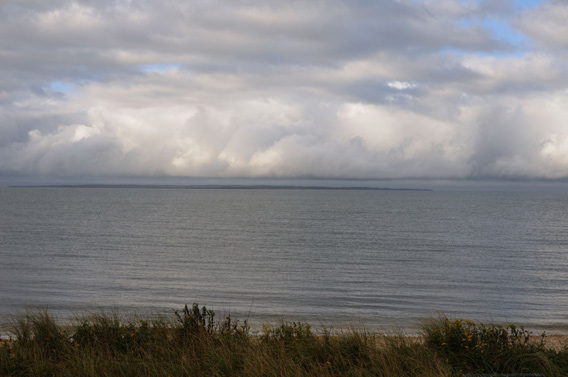 The view from Lazy Point. Photo courtesy of Carl Safina. Being compared—by more than one reviewer—to Henry Thoreau and Rachel Carson would make any nature writer’s day. But add in effusive reviews that compare one to a jazz musician, Ernest Hemingway, and Charles Darwin, and you have a sense of the praise heaped on Carl […]
The view from Lazy Point. Photo courtesy of Carl Safina. Being compared—by more than one reviewer—to Henry Thoreau and Rachel Carson would make any nature writer’s day. But add in effusive reviews that compare one to a jazz musician, Ernest Hemingway, and Charles Darwin, and you have a sense of the praise heaped on Carl […]
Feeds: news | india | latam | brasil | indonesia
 On the heels of calling for global action to combat climate change, Pope Francis on Thursday issued an apology for “sins” the Catholic church committed against the indigenous people in Latin America since the European conquest of the region. In an address to a gathering of activists in Santa Cruz, Bolivia Pope Francis asked for […]
On the heels of calling for global action to combat climate change, Pope Francis on Thursday issued an apology for “sins” the Catholic church committed against the indigenous people in Latin America since the European conquest of the region. In an address to a gathering of activists in Santa Cruz, Bolivia Pope Francis asked for […] Rainforest in Borneo. In a letter being widely heralded by environmentalists, yesterday Pope Francis called on world leaders to address threats to the planet, including climate change and species extinction. Notably, the leader of the Catholic Church singled out “human activity” as the main driver of these threats. Calling climate change an urgent challenge and […]
Rainforest in Borneo. In a letter being widely heralded by environmentalists, yesterday Pope Francis called on world leaders to address threats to the planet, including climate change and species extinction. Notably, the leader of the Catholic Church singled out “human activity” as the main driver of these threats. Calling climate change an urgent challenge and […] Marrying religion and conservation could be key to making Fiji’s fisheries sustainable Fijians appear to enter life with vocal cords prepped for singing. It’s an ideal trait, because most are deeply devoted to church where their voices are put to good use. When walking through villages on any given day, these beautiful sounds can be […]
Marrying religion and conservation could be key to making Fiji’s fisheries sustainable Fijians appear to enter life with vocal cords prepped for singing. It’s an ideal trait, because most are deeply devoted to church where their voices are put to good use. When walking through villages on any given day, these beautiful sounds can be […] Rainforest stream near Jantho in Aceh, Indonesia. Photos by Rhett A. Butler Aceh, Indonesia has found a new ally in the struggle to protect the province’s remaining natural forests: Sharia law. Last week, the government released a book titled “Guidelines for Forest Management Based on Sharia and Customary Law: Preventing Corruption in the Forestry Sector.” […]
Rainforest stream near Jantho in Aceh, Indonesia. Photos by Rhett A. Butler Aceh, Indonesia has found a new ally in the struggle to protect the province’s remaining natural forests: Sharia law. Last week, the government released a book titled “Guidelines for Forest Management Based on Sharia and Customary Law: Preventing Corruption in the Forestry Sector.” […] Innovation in Tropical Forest Conservation: Q&A with Dr. Shonil Bhagwat Entrance to a sacred grove in Kodagu, India. Photo courtesy of Shonil Bhagwat. “In Africa, you can come across Kaya forests of coastal Kenya, customary forests in Uganda, sacred forest groves in Benin, dragon forests in The Gambia or church forests in Ethiopia…You can also […]
Innovation in Tropical Forest Conservation: Q&A with Dr. Shonil Bhagwat Entrance to a sacred grove in Kodagu, India. Photo courtesy of Shonil Bhagwat. “In Africa, you can come across Kaya forests of coastal Kenya, customary forests in Uganda, sacred forest groves in Benin, dragon forests in The Gambia or church forests in Ethiopia…You can also […] In Southern Italy over the weekend, Pope Francis reiterated his view that environmental destruction constituted a sin. Visiting the largely agricultural region of Molise, the pope responded to an address by a local farmer attending university. “I fully agree what has been said about ‘safeguarding’ the earth, to bear fruit without ‘exploitation’. This is one […]
In Southern Italy over the weekend, Pope Francis reiterated his view that environmental destruction constituted a sin. Visiting the largely agricultural region of Molise, the pope responded to an address by a local farmer attending university. “I fully agree what has been said about ‘safeguarding’ the earth, to bear fruit without ‘exploitation’. This is one […] Pope Francis I, who named himself after the nature-loving Saint from Assisi, spoke about the need to safeguard creation during an audience at the Vatican last week. “We are Custodians of Creation,” he said on Wednesday. “But when we exploit Creation we destroy the sign of God’s love for us, in destroying Creation we are […]
Pope Francis I, who named himself after the nature-loving Saint from Assisi, spoke about the need to safeguard creation during an audience at the Vatican last week. “We are Custodians of Creation,” he said on Wednesday. “But when we exploit Creation we destroy the sign of God’s love for us, in destroying Creation we are […] Baby orangutans, like this Sumatran orangutan on its mother’s back, are often kept illegally in Indonesia. Photo by Rhett A. Butler Indonesia’s Islamic clerics drew praise from conservation groups last week after the top clerical body in the world’s largest Muslim-majority country issued a fatwa, or religious decree, against poaching and wildlife trafficking. The Indonesian […]
Baby orangutans, like this Sumatran orangutan on its mother’s back, are often kept illegally in Indonesia. Photo by Rhett A. Butler Indonesia’s Islamic clerics drew praise from conservation groups last week after the top clerical body in the world’s largest Muslim-majority country issued a fatwa, or religious decree, against poaching and wildlife trafficking. The Indonesian […] An international cement company Lafarge, winner of a Green Initiative award, is considering quarrying a cave in Malaysia which is the sole home of a critically endangered species. The proposed operations also threaten a Buddhist monastery near the cave where monks are facing eviction. Kanthan cave in Peninsular Malaysia is located in a limestone hill, […]
An international cement company Lafarge, winner of a Green Initiative award, is considering quarrying a cave in Malaysia which is the sole home of a critically endangered species. The proposed operations also threaten a Buddhist monastery near the cave where monks are facing eviction. Kanthan cave in Peninsular Malaysia is located in a limestone hill, […] The 2013 Zoos and Aquariums: Committing to Conservation (ZACC) conference runs from July 8th—July 12th in Des Moines, Iowa, hosted by the Blank Park Zoo. Ahead of the event, Mongabay.com is running a series of Q&As with presenters. For more interviews, please see our ZACC feed. Snow leopard. Photo by: Steve Winter/National Geographic. Tibetan monks […]
The 2013 Zoos and Aquariums: Committing to Conservation (ZACC) conference runs from July 8th—July 12th in Des Moines, Iowa, hosted by the Blank Park Zoo. Ahead of the event, Mongabay.com is running a series of Q&As with presenters. For more interviews, please see our ZACC feed. Snow leopard. Photo by: Steve Winter/National Geographic. Tibetan monks […] Tapping into religious teachings about stewardship, environmental activist Bandana Kaur enlists Sikhs around the world to safeguard the environment. Many religious groups have taken on the role of environmental custodians, citing scriptures that urge living in harmony with plants and animals. Representatives of nine world religions pledged in 2009 to develop environmental programs. The Sikh […]
Tapping into religious teachings about stewardship, environmental activist Bandana Kaur enlists Sikhs around the world to safeguard the environment. Many religious groups have taken on the role of environmental custodians, citing scriptures that urge living in harmony with plants and animals. Representatives of nine world religions pledged in 2009 to develop environmental programs. The Sikh […] Pope Francis I. Photo by: Casa Rosada. In his first homily as the new pope, Francis I spoke of the need to act as protectors both for the environment as well as for the poor and weak. With his focus on the environment the new pope echoes both his namesake, Saint Francis of Assisi, as […]
Pope Francis I. Photo by: Casa Rosada. In his first homily as the new pope, Francis I spoke of the need to act as protectors both for the environment as well as for the poor and weak. With his focus on the environment the new pope echoes both his namesake, Saint Francis of Assisi, as […] A monk at Wat That Thong temple in Bangkok During a Buddhist merit-making ceremony to pray for the tens of thousands of elephants poached annually. Photo by: © WWF Thailand. Buddhist leaders prayed for slaughtered African elephants in Bangkok, Thailand last week, reports WWF. During a special merit-making ceremony, often reserved for the recently deceased, […]
A monk at Wat That Thong temple in Bangkok During a Buddhist merit-making ceremony to pray for the tens of thousands of elephants poached annually. Photo by: © WWF Thailand. Buddhist leaders prayed for slaughtered African elephants in Bangkok, Thailand last week, reports WWF. During a special merit-making ceremony, often reserved for the recently deceased, […] A poster-child for rare species: the Javan rhino (Rhinoceros sondaicus) captured on camera trap in its last stand: Ujung Kulon National Park Java, Indonesia. Photo by: © Mike Griffiths / WWF-Canon. In his new book, The Kingdom of Rarities, Eric Dinerstein chases after rare animals around the world, from the maned wolf (Chrysocyon brachyurus) in […]
A poster-child for rare species: the Javan rhino (Rhinoceros sondaicus) captured on camera trap in its last stand: Ujung Kulon National Park Java, Indonesia. Photo by: © Mike Griffiths / WWF-Canon. In his new book, The Kingdom of Rarities, Eric Dinerstein chases after rare animals around the world, from the maned wolf (Chrysocyon brachyurus) in […] The Sri Dalada Maligawa Buddhist Temple, which may soon receive 359 elephant tusks. The Sri Lankan government is planning to give 359 elephant tusks to a Buddhist temple, a move that critics say is flouting the Convention on International Trade in Endangered Species (CITES). The illegal tusks were seized in Sri Lanka last May en […]
The Sri Dalada Maligawa Buddhist Temple, which may soon receive 359 elephant tusks. The Sri Lankan government is planning to give 359 elephant tusks to a Buddhist temple, a move that critics say is flouting the Convention on International Trade in Endangered Species (CITES). The illegal tusks were seized in Sri Lanka last May en […] Elephant herd in Kenya. It’s estimated that around 25,000 elephants were killed by poachers in 2011, though the number could be even higher. Photo by: Rob Roy. Responding to an investigative report by National Geographic, the Vatican has condemned elephant poaching for ivory and pledged three steps to help in the battle to save the […]
Elephant herd in Kenya. It’s estimated that around 25,000 elephants were killed by poachers in 2011, though the number could be even higher. Photo by: Rob Roy. Responding to an investigative report by National Geographic, the Vatican has condemned elephant poaching for ivory and pledged three steps to help in the battle to save the […] The Heartland Institute’s billboard campaign, which was pulled after 24 hours, has led to repercussions for the climate-denialist group. The Heartland Institute has lost two corporate supporters since it unveiled a billboard campaign that compared those who accept the science of climate change to mass murderer Ted Kaczynski also known as the Unabomber. Yesterday, State […]
The Heartland Institute’s billboard campaign, which was pulled after 24 hours, has led to repercussions for the climate-denialist group. The Heartland Institute has lost two corporate supporters since it unveiled a billboard campaign that compared those who accept the science of climate change to mass murderer Ted Kaczynski also known as the Unabomber. Yesterday, State […] Abandoned by conservationists and the global community, Virachey National Park in Cambodia remains a wildernesses of surprises. An interview with Greg McCann. Haling-Halang and the barrier mountains separating Cambodia and Laos as seen from the Veal Thom grasslands, a place few outsiders have ever seen. Could tigers, Javan rhinos, or saola live in these mountains? […]
Abandoned by conservationists and the global community, Virachey National Park in Cambodia remains a wildernesses of surprises. An interview with Greg McCann. Haling-Halang and the barrier mountains separating Cambodia and Laos as seen from the Veal Thom grasslands, a place few outsiders have ever seen. Could tigers, Javan rhinos, or saola live in these mountains? […].jpg) A view of Puerto Esperanza. Photo by: David Hill. A grassroots indigenous organization in Peru is calling for the removal of an Italian Catholic priest from the remote Amazon in response to his lobbying to build a highway through the country’s biggest national park. The park, in the Purus region in south-east Peru, was founded […]
A view of Puerto Esperanza. Photo by: David Hill. A grassroots indigenous organization in Peru is calling for the removal of an Italian Catholic priest from the remote Amazon in response to his lobbying to build a highway through the country’s biggest national park. The park, in the Purus region in south-east Peru, was founded […] View Larger Map A federal judge has suspended the construction of a 1,820 megawatt dam on the Teles Pires River in the Amazon. The judge found that indigenous communities were not properly consulted about the dam, which would flood a sacred site, known as the Seven Waterfalls, as well as imperil the livelihoods of indigenous […]
View Larger Map A federal judge has suspended the construction of a 1,820 megawatt dam on the Teles Pires River in the Amazon. The judge found that indigenous communities were not properly consulted about the dam, which would flood a sacred site, known as the Seven Waterfalls, as well as imperil the livelihoods of indigenous […] Amazon community on the Rio Corrientes. Photo by: Patrick le Flufy. “Shh, wait here,” Wilson told me. I ducked down behind the buttress of a large tree to wait. We had been walking through the jungle for a few hours. At first we followed a path through the undergrowth, a wet world of ferns, trunks […]
Amazon community on the Rio Corrientes. Photo by: Patrick le Flufy. “Shh, wait here,” Wilson told me. I ducked down behind the buttress of a large tree to wait. We had been walking through the jungle for a few hours. At first we followed a path through the undergrowth, a wet world of ferns, trunks […] A northern common cuscus in Misool, Raja Ampat. Photo by: Dmitry Telnov. How do indigenous communities hunt without pushing target species to local extinction? In other words, how have communities retained sustainable practices over countless generations? One answer is given in a new study by the Center for International Forestry Research (CIFOR) and the Center […]
A northern common cuscus in Misool, Raja Ampat. Photo by: Dmitry Telnov. How do indigenous communities hunt without pushing target species to local extinction? In other words, how have communities retained sustainable practices over countless generations? One answer is given in a new study by the Center for International Forestry Research (CIFOR) and the Center […] While pro-life activists usually target abortion, a new campaign is working to broaden the pro-life message. A $250,000 media campaign in the U.S., including TV spots and radio ads in eight states, hopes to pressure conservative senators to protect unborn children by supporting the Environmental Protection Agency’s (EPA) regulations on mercury emissions from coal-fired plants. […]
While pro-life activists usually target abortion, a new campaign is working to broaden the pro-life message. A $250,000 media campaign in the U.S., including TV spots and radio ads in eight states, hopes to pressure conservative senators to protect unborn children by supporting the Environmental Protection Agency’s (EPA) regulations on mercury emissions from coal-fired plants. […] One of the world’s top 25 most endangered primates: the roloway monkey (Cercopithecus diana roloway) photographed in the Munich Zoo. Saved from being converted into a vast palm oil plantation by PALM-CI in 2009, the Ehy Tanoé wetlands and forest in the Cote D’Ivoire (Ivory Coast) is home to three gravely endangered primates and as […]
One of the world’s top 25 most endangered primates: the roloway monkey (Cercopithecus diana roloway) photographed in the Munich Zoo. Saved from being converted into a vast palm oil plantation by PALM-CI in 2009, the Ehy Tanoé wetlands and forest in the Cote D’Ivoire (Ivory Coast) is home to three gravely endangered primates and as […] Cambodian villagers dressed as ‘avatars’ to protest the destruction of their forest. Photo courtesy of: Prey Lang Network. Two hundred Cambodians rallied in Phnom Penh last week to protest the widespread destruction of one of Southeast Asia’s last intact lowland rainforests, known as Prey Lang. In an effort to gain wider media attention, protestors donned […]
Cambodian villagers dressed as ‘avatars’ to protest the destruction of their forest. Photo courtesy of: Prey Lang Network. Two hundred Cambodians rallied in Phnom Penh last week to protest the widespread destruction of one of Southeast Asia’s last intact lowland rainforests, known as Prey Lang. In an effort to gain wider media attention, protestors donned […] As the honorary speaker at an event celebrating fifty years of the conservation organization World Wide Fund for Nature (WWF), Archbishop Desmond Tutu stated that overconsumption and obsession with economic growth were imperiling the global environment and leaving the poor behind. “Our desire to consume everything of value, to extract every precious stone, every drop […]
As the honorary speaker at an event celebrating fifty years of the conservation organization World Wide Fund for Nature (WWF), Archbishop Desmond Tutu stated that overconsumption and obsession with economic growth were imperiling the global environment and leaving the poor behind. “Our desire to consume everything of value, to extract every precious stone, every drop […] The view from Lazy Point. Photo courtesy of Carl Safina. Being compared—by more than one reviewer—to Henry Thoreau and Rachel Carson would make any nature writer’s day. But add in effusive reviews that compare one to a jazz musician, Ernest Hemingway, and Charles Darwin, and you have a sense of the praise heaped on Carl […]
The view from Lazy Point. Photo courtesy of Carl Safina. Being compared—by more than one reviewer—to Henry Thoreau and Rachel Carson would make any nature writer’s day. But add in effusive reviews that compare one to a jazz musician, Ernest Hemingway, and Charles Darwin, and you have a sense of the praise heaped on Carl […]